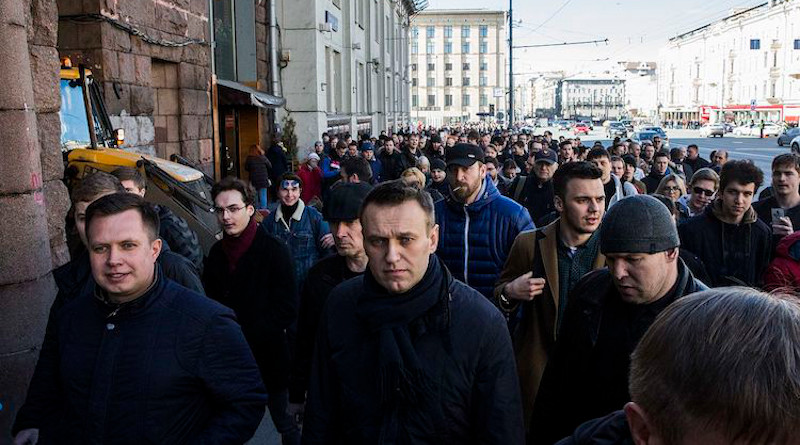Navalny, Russia And Putin – OpEd
After Aleksey Navalny was detained on Sunday immediately after arriving in Russia from Berlin, where he was treated for Novichok poisoning, leaders of the US and the EU demanded that he be released at once. Navalny’s lawyers were able to meet their client only 15 hours after his detainment, while the trial was held right there at the detention facility and featured a single judge, instead of the usual three.
Naturally, Navalny felt very confused. His press secretary Kira Yarmush posted a video from the makeshift courtroom where Navalny blamed Vladimir Putin for everything that had happened. “I have witnessed many mockeries of the court, but it seems that the old man in the bunker is so afraid that they have decided to throw the criminal code out of the window. This is the highest degree of unlawfulness, that is the only way I can describe this,” said Navalny.
In another video, Navalny urged the Russian people to take to the streets in order to say loud and clear that they are tired of the “gang of thieves that has ruled the country for twenty years”.1
We don’t know what the “old man in the bunker” said or thought, but prior to the Saturday protests numerous close allies of Navalny were detained, including lawyer of the Anti-Corruption Foundation Lubov Sobol and Navalny’s press secretary Kira Yarmush.2
But it wasn’t enough simply to detain Navalny’s supporters – the government also threatened of the consequences for those who will decide to participate in the peaceful protests.3 Russian prosecutors warned Navalny’s supporters not to incite people to “illegal mass protests”, adding that law enforcement authorities have been suggested to carry out preventive measures and even imprison people if necessary.
After the video appeared online, Navalny’s supporters published another video in social media urging people to support Navalny and take to the streets on Saturday to protest against the Kremlin.
Wednesday, Russia’s media watchdog Roskomnadzor warned social media platforms not to popularize posts that urge people to participate in the protests. Roskomnadzor announced that it has officially informed TikTok and VKontakte that they must stop spreading “illegal information that invites adolescents to participate in illegal activities”.4
In response to a request by the Office of the Prosecutor General, content that “urged children to participate in illegal mass events” was removed from Russian social media networks. The Russian censorship agency Roskomnadzor confirmed on Friday that the social network TikTok has deleted 38% of the content that was deemed illegal, VKontakte and YouTube deleted 50% of such content, while Instagram deleted only 17%.
Roskomnadzor noted that most of the activity regarding the protests of 23 January took place in TikTok, but it did add that the “new incitements” to the protests were spread “artificially”.
On 22 January, MBX Media reported that the Russian social network VKontakte has blocked two thirds (59 out of 83) pages concerning the 23 January protests. Despite these pages being unavailable in Russia, they could still be accessed from abroad.5
Russian authorities intend to give Navalny a prison sentence of 3.5 years, followed by another ten years in prison, as was reported on Friday by Bloomberg citing two sources close to the Kremlin.6
Putin’s concerns are very well understandable – if prior to this, he could simply observe what is taking place in Belarus, now it seems that the same is about to happen in Russia. If this does indeed happen, it’s quite likely that the Belarusian people will succeed in their efforts, since Putin will be forced to protect himself and will have no time to aid Lukashenko.
I assume that some might say – well, Russia abides by international law, so Navalny should just turn to that to get justice.
When I hear such statements, I can’t help myself not to laugh. Why? Russia has shown numerous times that it completely doesn’t care about international law. Examples – Georgia, Ukraine, etc. What is more, Russia is the only country that publicly states that it abides by international law, but in reality violates it in all ways imaginable.
To achieve this, on 8 December 2020 Putin signed a series of amendments that stipulates that Russian law precedes international agreements and decisions made by international institutions.7
This means that Russia will not carry out any decisions made by an international authority – it will simply say that it contradicts the Russian constitution. There have already been cases when Russia has stated that a ruling by the European Court of Human Rights goes against the constitution of Russia and therefore will not be carried out.
Essentially, Putin’s clique can do whatever it wants, and no one can do anything about it. If they don’t like someone – for instance someone like Navalny – they will make up a law or won’t even bother with hiding behind laws and simply imprison the person.
No international institution will be able to object, no convention will have any power because the Russian court will have made its decision. We will not dive any deeper, for instance, into the fact that courts hand out sentences according to the wishes of particular persons. But the main takeaway is that Russia can do whatever it wants.
However, there’s one thing that the bunker grandpa hasn’t taken into the consideration – yes, Russians are very patient, but even patience has its limits. It’s difficult to predict what these protests will result in, but there definitely is a sense that this is the beginning of the end of Putin’s era.
6https://www.tvnet.lv/7161924/bloomberg-kremlis-plano-navalnijam-piespriest-ilgstosu-cietumsodu

